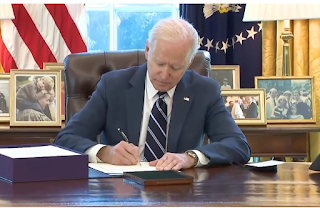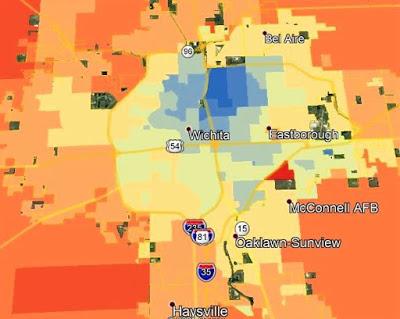
[Cross-posted to Wichita Story]
When President Joe Biden signed into law the American Rescue Plan (ARP) a little more than a week ago, I commented to some friends that this may arguably turn to be one of the best things that has happened to Wichita in a very long time. Let me explain that argument here—starting with a rephrase of my original comment: the ARP will likely turn out to be one of the best things that has happened for many Wichitans in a very long time.
Why the change? In part because there are a thousand ways to think about a city, depending on the perspective of the person doing the thinking, and for every metric I or someone else might propose, someone else can surely come up with a different, countering one. While I don’t think that makes it impossible or inappropriate to talk in generalities about the common good (actually, I think it is both possible and necessary to do so), it doesmean that I have to respect the perspective of tens of thousands of Wichitans, or more, who, for any number of reasons, hate (or at least have been told to hate, or hold to a political orientation which presumes—wrongly, I think—that they are supposed to hate) this latest stimulus.
Note however, that there are fewer such people than you might believe. While there were nearly 30,000 more people who voted for Donald Trump than for President Biden throughout Sedgwick County last November, leading the former president to win the county with 52% of the vote, that doesn’t hold for the city of Wichita itself, as this precinct-based graphic makes clear:

The city of Wichita isn’t entirely blue—not yet, anyway, and maybe not ever. But from Oaklawn to Bel Aire, the zoo to Eastborough, the default Republican preference of Kansans was challenged in our city, with a majority of voters throughout Wichita’s precincts going for Biden. Which means, if nothing else, that the passage of the American Rescue Plan is, for those voters, a huge confirmation of their political choice--a win, in other words. And not just a political win, obviously; nearly 100,000 households across Wichita are going to receive the $1400 per person stimulus checks (it would have been nearly 120,000 households, or easily 75% of the total population of the city, if moderate Democratic and Republican senators, including Wichita’s own two, hadn’t balked).
The Republicans of our city could push back at this point: the CARES Act which Trump pushed for did that too! True, but not to the same extent, and not as effectively. The ARP is actually giving more money to more people than did the CARES Act, which spent nearly three times as much money on businesses than on individuals and households. And while that money, mostly administered through the Paycheck Protection Program, was a lifesaver for some businesses, it was poorly administered, with comparatively little going to the employers that needed it most, thus having much less of an impact as it might have had, not to mention generating a lot of frustration and abuse along the way, as Wichita knows from plenty of local examples.
This can be debated, of course, as anything that involves hundreds of millions of people and hundreds of billions of dollars can be. Those who see the ARP as the second coming of the New Deal--whether hopefully or fearfully--should be prepared for disappointment; fundamentally, it’s really just another emergency stimulus package, first and last. It’s even possible that the CARES payment, when one really gets into the weeds, did more for working people than the ARP will. Now, if it works out that the additional child tax credits and increased unemployment and pension assistance which the ARP provides are made permanent—and the language of President Biden himself surely indicates that such is his intention—then that would retroactively turn the ARP into a genuinely transformative accomplishment, as much as Social Security or Medicare were. So if Wichita’s Republicans want to insist Biden didn’t do anything Trump didn’t already do, insofar as actual cash investments in the lives of struggling parents, workers, and retirees are concerned, the fairest answer may be: maybe; let’s wait and see.
But fortunately, there is an additional element to the ARP which we won’t have to wait a long time for, which demonstrates the true value of the act to Wichita’s development, and which involves something that the CARES Act barely touched upon: namely, direct aid to cities. Not just states (though they’ll getting plenty of support for all the programs they’re obliged to carry out too), but the municipal governments of "metropolitan cities," to use the actual language of the law. Wichita’s budget is facing estimated shortfalls of nearly $30 million over 2020-2021 thanks to the pandemic, with more likely to come in the future; the fact that the ARP will likely deliver close to $73 million to the city (according to the latest estimates) will make a massive difference in the costs which that revenue loss will mean to the quality of life in our city.
(As an important aside, note that by setting up a program which bypasses states and counties, Wichita, and cities like it, may be able to avoid what looks likely to become a sticky constitutional and political fight, as some state leaders--including our own Kansas Attorney General Derek Schmidt--have argued that they ought to be able to use the ARP funds which will be given to states to cover new tax cuts, leaving the issue of making up for budget cuts to state programs aside. And that doesn't even touch the proposal by some Kansas legislators to grab up to $100 million of federal relief funds, presumably out of that which would be directed to Kansas counties, and use it to compensate businesses for their losses as punishment for the counties having imposed shut-down mandates as the governor directed. Wherever these destructive arguments go, they should touch that money directed to Wichita itself.)
I wrote “quality of life” up above purposefully. Thanks to the covid budget priorities the city council established last August, in which the Wichita Police Department enjoyed (in the midst of much protest and counter-protest) a large increase, the cuts which were introduced were overwhelming in the area of public arts, city libraries, capital improvements, parks and trees and sidewalks and bike paths and like. While clearly ARP funds will need to be used to first and foremost to support and supplement various localized covid-relief and anti-poverty measures (though honestly, given the distribution of responsibility between the city and the county, those should mostly come out of the $100 million or so which the Sedgwick County Commission will receive), if the spirit of this aid is adhered to by our city council at all (perhaps as encouraged by concerned citizens like you and me?) then we’ll see this important source of relief used to help begin to rejuvenate, and perhaps even re-direct, a city whose cultural offerings and music scene and patterns of growth (or lack thereof) have been taking major hits not just throughout the past year, but for quite a few years previously.
What is the “spirit of this aid” I mention? Simply the fact that the Biden administration, as it shaped and pushed for this relief package, had a set of priorities very different, and far more urban, than those of the Trump administration. The latter was happy to contribute to already deepening divisions in American society by tweeting at great length about “Democrat-run cities” with their “anarchist jurisdictions,” which is the sort of thing which leads Republican politicians like Kansas First District Representative Jake LaTurner to dismiss the whole thing as a scam to “bail out liberal states.”Those who are actually involved in administering cities, whether in red states or blue ones, know that is absolutely not true, and have said so at length. But the real story is buried within many and various ideas, plans, and people which Biden has brought with him to Washington.
While Trump’s re-election built itself in part upon distracting claims about how Biden’s crazed socialist ideas were going to destroy the (white) American suburban ideal, Biden’s campaign instead recognized that America’s suburban homeowner form houses a lot of racial and ethnic minorities, whose social and economic challenges required a response quite different from Trump’s culture war attacks. Biden’s push for more racial equity and low-income options among America’s suburban developmentgoes hand-in-hand with lessening exclusive zoning requirements, encouraging greater density in development, and looking to expand transportations choices beyond just the well-subsidized suburban access roads and freeway on-ramps which have defined metropolitan sprawl for far too long, which in turn makes his nomination of Pete Buttigieg--a favorite of the Strong Towns movement!--as Secretary of Transportation potentially so important.
To be sure, you can legitimately criticize all of these supports as something that will actually undermine, rather than democratically empower, localities; I take all these criticisms seriously (even, to my surprise, the ones about zoning reform), and so should anyone else with genuinely localist and small-d democratic concerns about urban spaces in general. And yet, to see all of this happening in Washington, and underwritten at least in part by the ARP, at the same time that Wichita’s leaders are finally seriously talking about these related matters via their Places for People initiative, makes me wonder if there isn’t some kind of unforeseen alignment taking place. An alignment that will allow the different Wichita that is out there to take the support being offered it, and use it to build and encourage, in the midst of what is sure to be a long and difficult economic recovery, the kind of culturally-enriching, family-rewarding, individually-satisfying, community places and practices that Wichita has too-often sacrificed in the name of its usual, easily-fallen-back-into growth-centric routines.
It won’t come easily, of course, and it may not come at all. And if it does come, it won’t be a change that pleases the large number of Wichitans who look upon any push for greater urban sustainability, density, and equality in this city as antithetical to the small-town conservatism which they want to continue to imagine is appropriate for an urban area of a half-million people. That’s fair, I suppose. But I also suspect that, as a great many Wichitans emerge from what was probably, for the majority of us, one of the worst years of our lives, at least a few of us can see the possibility of some better—and even, maybe, differently better—times ahead. And even if not—well, 2021 can’t get any worse than last year, can it?
